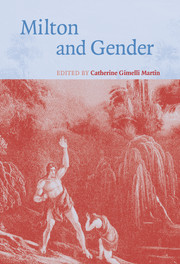Book contents
- Frontmatter
- Contents
- List of illustrations
- Notes on contributors
- Acknowledgments
- Abbreviations
- Introduction: Milton's gendered subjects
- PART I MASCULINITY, DIVORCE, AND MISOGYNY IN MILTON'S PROSE
- PART II THE GENDERED SUBJECTS OF MILTON'S MAJOR POEMS
- 4 The profession of virginity in A Maske Presented at Ludlow Castle
- 5 The genders of God and the redemption of the flesh in Paradise Lost
- 6 Transported touch: the fruit of marriage in Paradise Lost
- 7 The experience of defeat: Milton and some female contemporaries
- 8 Samson and surrogacy
- 9 “I was his nursling once”: nation, lactation, and the Hebraic in Samson Agonistes
- 10 “The Jewish Question” and “The Woman Question” in Samson Agonistes: gender, religion, and nation
- PART III GENDERED SUBJECTIVITY IN MILTON'S LITERARY HISTORY
- Index
4 - The profession of virginity in A Maske Presented at Ludlow Castle
Published online by Cambridge University Press: 22 September 2009
- Frontmatter
- Contents
- List of illustrations
- Notes on contributors
- Acknowledgments
- Abbreviations
- Introduction: Milton's gendered subjects
- PART I MASCULINITY, DIVORCE, AND MISOGYNY IN MILTON'S PROSE
- PART II THE GENDERED SUBJECTS OF MILTON'S MAJOR POEMS
- 4 The profession of virginity in A Maske Presented at Ludlow Castle
- 5 The genders of God and the redemption of the flesh in Paradise Lost
- 6 Transported touch: the fruit of marriage in Paradise Lost
- 7 The experience of defeat: Milton and some female contemporaries
- 8 Samson and surrogacy
- 9 “I was his nursling once”: nation, lactation, and the Hebraic in Samson Agonistes
- 10 “The Jewish Question” and “The Woman Question” in Samson Agonistes: gender, religion, and nation
- PART III GENDERED SUBJECTIVITY IN MILTON'S LITERARY HISTORY
- Index
Summary
It is hard to calculate the genre-shock and gender-shock of Milton's Ludlow Maske. Its staging of Alice Egerton's passage into womanhood reconfigures the totemic magic of the masque genre by making the figure of the virgin, rather than the king, the emblem and human center of the moral and regenerative energies of the world. In her profession of virginity (Maske 779–99), the Lady articulates an ethical and aesthetic self-recognition which signals not only her invulnerability to Comus, but her prophetic arrival at moral and sexual maturity. The Lady's virginity, as she exercises it and represents it in poetry, song, and ultimately in dance, discloses itself as the point where the temporal realities of bodily existence intersect with the spiritual possibilities of the eternal. If the mythic subtexts of her ordeal threaten her with dismemberment and dispersal, virginity is the outward and visible sign of continuity, integration, and unity. It is not the fugitive and cloistered virtue valorized in patristic and medieval doctrines of celibacy, but the source of an activist, expressive, world-challenging magic consonant with Reformation social theology and complementary to its sexual ethic of companionate marriage. It makes her rhetorically and politically stronger, rather than more vulnerable.
So the Lady's high-minded, austere rebuke to Comus is not a recycling of medieval notions of celibacy. It advocates virginity as a preemptive defense of and preparation for a chaste life of “redeemed sexuality”:
Shall I go on?
Or have I said enough? to him that dares
Arm his profane tongue contemptuous words
Against the Sun-clad power of Chastity
Fain would I something say, yet to what end? […]
- Type
- Chapter
- Information
- Milton and Gender , pp. 77 - 94Publisher: Cambridge University PressPrint publication year: 2005



